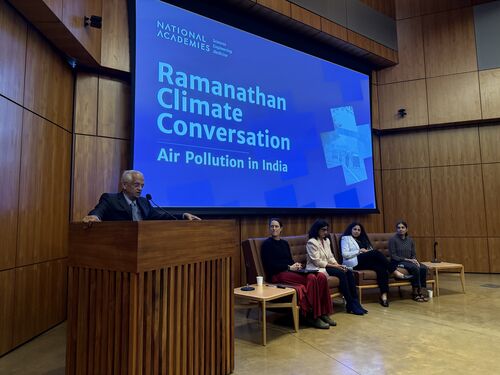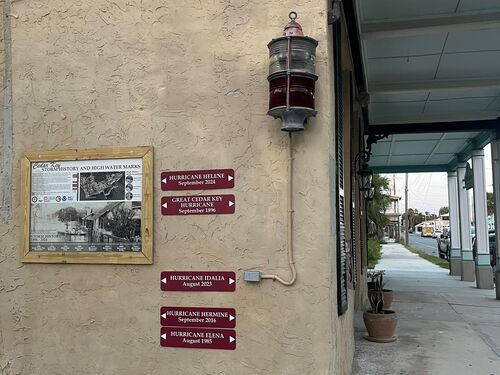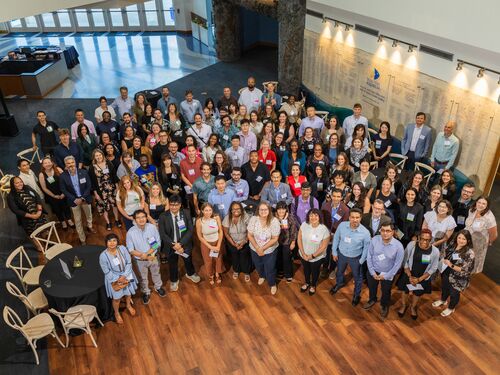Gulf Research Program Awards $4.4 Million to Support Safer Offshore Energy Systems
Program News
Last update November 6, 2023
WASHINGTON — The Gulf Research Program (GRP) of the National Academies of Sciences, Engineering, and Medicine has awarded $4.4 million to support five projects that aim to increase safety culture in an evolving offshore energy environment by addressing the future needs of safety management systems (SMS).
As communities adapt to a changing climate and the nation works to meet a goal of net-zero emissions by 2050, the demand for integrating cleaner energy sources into the nation’s energy portfolio introduces additional complexity to the offshore energy environment. While many questions remain around the energy transition, a robust safety culture and effective SMS are essential to ensure the safety and sustainability of offshore energy production.
The GRP’s Safer Offshore Energy Systems grants support activities that reduce or manage risks associated with offshore energy production and transportation. These include identifying best practices and effective activities; documenting and applying lessons learned from past incidents and near misses; and encouraging collaboration among industry, regulatory, and academic communities to advance understanding and communication about systemic risk in the offshore energy environment.
“Together, these grantees will assess and analyze ways that the industry can advance its safety management systems in ways that empower offshore stakeholders to manage systemic risk and improve safety culture,” said Jim Pettigrew, director of the GRP’s Board on Gulf Offshore Energy Safety. “The goal of these projects is to gather transferable lessons that will increase the overall safety of the offshore energy system as it continues to evolve, recognizing that safety is a critical component of navigating the energy transition.”
The five awarded projects are:
Project Title: A Stakeholder-Driven Decision-Support Tool for Empowering Fatigue Risk Management: Towards Next-Gen Safety Management Systems
Project Director: Ranjana Mehta
Organization: University of Wisconsin-Madison
Award: $1,200,094
Project Summary:
One highly recognized but under-addressed hazard in the offshore industry is fatigue. Correspondingly, the proposed research focuses on shared individual and organizational efforts to manage fatigue (e.g., Fatigue Risk Management Systems), which can either be a part of SMS or a separate policy. This proposal adopts a stakeholder-driven approach to develop a technology-enabled decision-support tool to assess and control fatigue risks while uncovering opportunities and barriers to empowering offshore energy stakeholders to integrate the tool as part of the company’s SMS/FRMS. Informed by these efforts, the team will implement the tool and provide training across three offshore platforms and evaluate the tool’s effectiveness on safety outcomes (behaviors and reports of incidents/near misses), safety culture, tool utilization, and user experience through a longitudinal intervention study. The project outputs (decision-support tool source codes, training/implementation documentation, etc.) and findings obtained here will be shared with the project partners and disseminated across scientific and practitioner venues.
Project Title: Empowering and Enhancing Offshore Workers’ SWA, UWA, Reporting Unsafe Conditions, and Employee Participation
Project Director: Changwon Son
Organization: Texas Tech University
Award: $855,760
Project Summary:
The primary objective is to address challenges of offshore workers’ implementation of stop work authority, ultimate work authority, reporting unsafe conditions, and employee participation (SURE) programs. These programs were added to the Bureau of Safety and Environmental Enforcement’s Safety and Environmental Management System in 2013; however, offshore workers have faced persistent difficulties conducting these activities (e.g., stopping others’ work) due to poor safety culture and lack of hazard awareness skills. To overcome the problems, this project aims to develop and implement a collection of worker-centered safety tools termed the “SURE Toolbox.” Such safety tools include education and training materials, operating procedures, observation and reporting cards, end-user manuals, team safety meeting guidelines, and data analytics of the SURE activities. To advance safety culture, the SURE Toolbox will focus on fostering positive leadership, feedback sharing and seeking, and a psychological safety climate. To help offshore workers identify hazards accurately, the SURE Toolbox will incorporate situation awareness principles and techniques. Results and products of the project will be available via a publicly accessible digital repository, a mobile app, webinars, workshops, online videos, professional and academic conferences, and meetings with offshore industry organizations.
Project Title: Using Safety Culture Assessment Data to Enhance Safety and Environmental Management System Effectiveness
Project Director: Kevin McSweeney
Organization: American Bureau of Shipping
Award: $724,512
Project Summary:
This project aims to better understand the close-knit relationship between an organization’s safety culture and its Safety and Environmental Management System (SEMS). Asset owners and lessees conduct SEMS audits, as does the Bureau of Safety and Environmental Enforcement. These audits often identify discrepancies and opportunities for improvement, which necessitate corrective actions; however, these audits do not necessarily find “why” the SEMS requirements were not implemented or maintained. This project will investigate and develop a methodology to help integrate safety culture-related assessment activities into evaluating an organization’s SEMS. The goal is to work with industry stakeholders and perform safety culture activities, perform assessments of their SEMS and previous audit results, and evaluate the proposed methodology to help strengthen the organization’s SEMS (i.e., continual improvement). The project will identify where the BSEE safety factors are addressed and identify potential best practices that can be used to improve an existing SEMS.
Project Title: Optimizing Risk-Based Decisions: Evolutionary Safety Management Systems
Project Director: Daniel Shantz
Organization: Tulane University
Award: $1,300,000
Project Summary:
This project seeks to develop, implement, and evaluate an innovative, foundational safety data collection and safety management system pilot program that combines increased accessibility to safety data and broad application of the Success Path Method as a core element of an evolutionary SMS, proving a systematic approach for optimizing risk-based decisions in an evolving energy safety environment in the Gulf of Mexico. Project results will be shared with operators in the SafeOCS Industry Safety Data program (representing 90% of the total production output in the Gulf).
Project Title: Anticipating Challenges to Today’s Offshore Safety Management Framework Caused by Gulf Energy Transition Initiatives
Project Director: Joseph Rousseau
Organization: American Bureau of Shipping
Award: $368,622
Project Summary:
The Gulf of Mexico is about to undergo massive change associated with energy transition initiatives, and these changes will present new challenges to the Offshore Safety Management Framework (SMF) for the Gulf. Offshore wind, ocean energy systems, CO2 capture and sequestration systems, new oil and gas production and exploration technologies, the possibility of advanced nuclear technology deployments, and associated marine construction and support activities with a wide range of new stakeholders will transform the Gulf between now and 2050 when decarbonization goals have been set. This project aims to (1) identify and assess the key changes that are coming to Gulf with energy transition, (2) examine how these changes are likely to challenge the current SMF in the Gulf, and (3) make recommendations for proactively adapting the SMF to stay ahead of emerging risks. This project will be led by the not-for-profit marine classification society for the U.S., the American Bureau of Shipping, in collaboration with key industry/academic coalitions closely associated with energy transition in the Gulf: Louisiana Wind Energy Hub, Offshore Energy Safety Institute, and Blue-Sky Maritime Coalition.
Project Title: A Stakeholder-Driven Decision-Support Tool for Empowering Fatigue Risk Management: Towards Next-Gen Safety Management Systems
Project Director: Ranjana Mehta
Organization: University of Wisconsin-Madison
Award: $1,200,094
Project Summary:
One highly recognized but under-addressed hazard in the offshore industry is fatigue. Correspondingly, the proposed research focuses on shared individual and organizational efforts to manage fatigue (e.g., Fatigue Risk Management Systems), which can either be a part of SMS or a separate policy. This proposal adopts a stakeholder-driven approach to develop a technology-enabled decision-support tool to assess and control fatigue risks while uncovering opportunities and barriers to empowering offshore energy stakeholders to integrate the tool as part of the company’s SMS/FRMS. Informed by these efforts, the team will implement the tool and provide training across three offshore platforms and evaluate the tool’s effectiveness on safety outcomes (behaviors and reports of incidents/near misses), safety culture, tool utilization, and user experience through a longitudinal intervention study. The project outputs (decision-support tool source codes, training/implementation documentation, etc.) and findings obtained here will be shared with the project partners and disseminated across scientific and practitioner venues.
Project Title: Empowering and Enhancing Offshore Workers’ SWA, UWA, Reporting Unsafe Conditions, and Employee Participation
Project Director: Changwon Son
Organization: Texas Tech University
Award: $855,760
Project Summary:
The primary objective is to address challenges of offshore workers’ implementation of stop work authority, ultimate work authority, reporting unsafe conditions, and employee participation (SURE) programs. These programs were added to the Bureau of Safety and Environmental Enforcement’s Safety and Environmental Management System in 2013; however, offshore workers have faced persistent difficulties conducting these activities (e.g., stopping others’ work) due to poor safety culture and lack of hazard awareness skills. To overcome the problems, this project aims to develop and implement a collection of worker-centered safety tools termed the “SURE Toolbox.” Such safety tools include education and training materials, operating procedures, observation and reporting cards, end-user manuals, team safety meeting guidelines, and data analytics of the SURE activities. To advance safety culture, the SURE Toolbox will focus on fostering positive leadership, feedback sharing and seeking, and a psychological safety climate. To help offshore workers identify hazards accurately, the SURE Toolbox will incorporate situation awareness principles and techniques. Results and products of the project will be available via a publicly accessible digital repository, a mobile app, webinars, workshops, online videos, professional and academic conferences, and meetings with offshore industry organizations.
Project Title: Using Safety Culture Assessment Data to Enhance Safety and Environmental Management System Effectiveness
Project Director: Kevin McSweeney
Organization: American Bureau of Shipping
Award: $724,512
Project Summary:
This project aims to better understand the close-knit relationship between an organization’s safety culture and its Safety and Environmental Management System (SEMS). Asset owners and lessees conduct SEMS audits, as does the Bureau of Safety and Environmental Enforcement. These audits often identify discrepancies and opportunities for improvement, which necessitate corrective actions; however, these audits do not necessarily find “why” the SEMS requirements were not implemented or maintained. This project will investigate and develop a methodology to help integrate safety culture-related assessment activities into evaluating an organization’s SEMS. The goal is to work with industry stakeholders and perform safety culture activities, perform assessments of their SEMS and previous audit results, and evaluate the proposed methodology to help strengthen the organization’s SEMS (i.e., continual improvement). The project will identify where the BSEE safety factors are addressed and identify potential best practices that can be used to improve an existing SEMS.
Project Title: Optimizing Risk-Based Decisions: Evolutionary Safety Management Systems
Project Director: Daniel Shantz
Organization: Tulane University
Award: $1,300,000
Project Summary:
This project seeks to develop, implement, and evaluate an innovative, foundational safety data collection and safety management system pilot program that combines increased accessibility to safety data and broad application of the Success Path Method as a core element of an evolutionary SMS, proving a systematic approach for optimizing risk-based decisions in an evolving energy safety environment in the Gulf of Mexico. Project results will be shared with operators in the SafeOCS Industry Safety Data program (representing 90% of the total production output in the Gulf).
Project Title: Anticipating Challenges to Today’s Offshore Safety Management Framework Caused by Gulf Energy Transition Initiatives
Project Director: Joseph Rousseau
Organization: American Bureau of Shipping
Award: $368,622
Project Summary:
The Gulf of Mexico is about to undergo massive change associated with energy transition initiatives, and these changes will present new challenges to the Offshore Safety Management Framework (SMF) for the Gulf. Offshore wind, ocean energy systems, CO2 capture and sequestration systems, new oil and gas production and exploration technologies, the possibility of advanced nuclear technology deployments, and associated marine construction and support activities with a wide range of new stakeholders will transform the Gulf between now and 2050 when decarbonization goals have been set. This project aims to (1) identify and assess the key changes that are coming to Gulf with energy transition, (2) examine how these changes are likely to challenge the current SMF in the Gulf, and (3) make recommendations for proactively adapting the SMF to stay ahead of emerging risks. This project will be led by the not-for-profit marine classification society for the U.S., the American Bureau of Shipping, in collaboration with key industry/academic coalitions closely associated with energy transition in the Gulf: Louisiana Wind Energy Hub, Offshore Energy Safety Institute, and Blue-Sky Maritime Coalition.
The National Academies’ Gulf Research Program is an independent, science-based program founded in 2013 as part of legal settlements with the companies involved in the 2010 Deepwater Horizon disaster. It seeks to enhance offshore energy system safety and protect human health and the environment by catalyzing advances in science, practice, and capacity to generate long-term benefits for the Gulf of Mexico region and the nation. The program has $500 million for use over 30 years to fund studies, projects, and other activities in the areas of research and development, education and training, and monitoring and synthesis.
The National Academies of Sciences, Engineering, and Medicine are private, nonprofit institutions that provide independent, objective analysis and advice to the nation to solve complex problems and inform public policy decisions related to science, engineering, and medicine. The National Academies operate under an 1863 congressional charter to the National Academy of Sciences, signed by President Lincoln.
Contact:
Pete Nelson, Director of Communications
Gulf Research Program
PNelson@nas.edu




